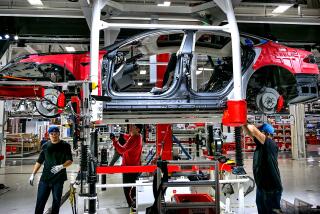Motorola Again Predicts Lower Results
- Share via
Motorola has long held a place in the pantheon of admired American companies. So when the Schaumburg, Ill.-based electronics company announced last fall that its second-quarter earnings wouldn’t meet expectations, the news triggered a full-scale plunge in tech stocks.
But when it announced similar news Wednesday that third-quarter earnings would be “significantly below expectations,” sending its shares plunging $1.50 to $49.25 on the New York Stock Exchange, other tech stocks held steady.
For a growing number of critics, it was another sign that Motorola’s problems go beyond the current semiconductor slump and pricing wars plaguing the industry. “They’ve become arrogant,” says Charles Biderman, editor of Wireless Trim Tabs, a Santa Rosa, Calif., investment newsletter and a frequent Motorola critic. “They make business decisions based on the idea that a breakthrough technology will be ready when they have no idea.”
Motorola’s insistence that distributors carry its full line of cellular phones before being allowed to sell StarTac, its hot new miniature cell phone, has caused a mini-rebellion among some angry customers.
And longtime admirers have flinched at the company’s sloppy performance in introducing new technologies in fields ranging from personal digital assistants and satellite systems to two-way radio systems.
The harvest of these missteps is visible in the company’s announcement Wednesday that its per-share earnings for the third quarter ending Sept. 30 will be at least 25% below the prevailing estimates of 50 cents a share. That figure is itself 38% below the year-ago earnings of 81 cents a share.
Company representatives are unapologetic. “We’re creating new technology, and that takes time,” says a Motorola spokesman. He says the company’s current weakness represents a technological transition taking place in cellular telecommunications and other key markets.
Motorola fans, who are still legion, insist that the company will have a sharp rebound next year as the chip market improves and kinks are worked out of its new wireless technologies.
But there is growing evidence that Motorola may be battling on too many fronts.
In cellular, for example, Motorola’s research efforts are spread out among three standards: the currently popular “analog” cell phones and two different digital standards.
Motorola’s heaviest bet has been on a digital technology called CDMA (for “code-division multiple access”) that is purportedly far more efficient in using the airwaves, but which has been years late in getting to market.
The result: European competitors like Finland’s Nokia and Sweden’s LM Ericsson, which focused exclusively on the more common digital standard known as GSM, have cut deeply into Motorola’s share of the world market.
Even in its strong domestic base, Motorola’s market share in cell phones has fallen to less than 50% from a high of 63% at the end of 1994, according the Herschel Shosteck Associates, a Maryland-based market research company.
Motorola’s bet on CDMA--it has spent an estimated $1 billion or more on the technology--may also have contributed to its missing out on explosive growth in the Japanese market. After getting the U.S. government to force Japan to change policies considered unfair to the company, it was late in introducing key products to the newly opened market.
Analysts say that as its financial fortunes decline, Motorola may find it increasingly hard to support all of those costly ventures at once. The company has already announced that it will cut back on its semiconductor investments to shore up its earnings.
Yet, the company is tackling tough new markets that could prove to be even more costly diversions of corporate resources.
Motorola has licensed rights to Apple Computer Inc. software and is expected soon to begin manufacturing a Macintosh clone based on the PowerPC microprocessor it jointly developed with IBM.
The microprocessor has been a disappointment, with sales lagging in tandem with the decline in Apple’s fortunes. And early hopes that the chip would become an alternative to Intel’s Pentium line were dashed when even IBM chose not to use the chip in its PCs.
(BEGIN TEXT OF INFOBOX / INFOGRAPHIC)
Earnings Drop
Motorola’s earnings have been falling, and the company said Wednesday it expects its troublesto continue. Quarterly earnings, in millions:
1996: $326
Source: Bloomberg Business News, Times reports.
Researched by JENNIFER OLDHAM / Los Angeles Times




